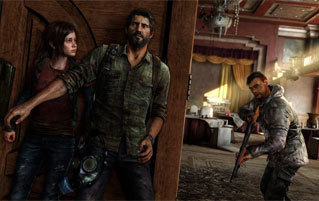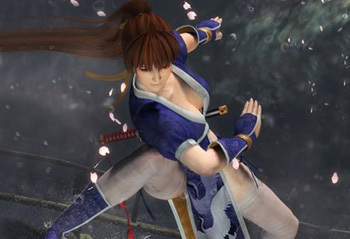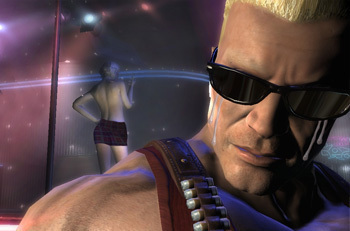6 Sexist Video Game Problems Even Bigger Than the Breasts

Some video games are more obviously focused on women's genitals than a gynecologist exam. In games like TERA, a woman's armor is a map of her erogenous zones, defending her from only the most technical definition of nudity. Dead or Alive uses more computer power to model Kasumi's breasts than NASA had for the moon landings. That's actually not a joke.

And the results deal with similar levels of gravitational attraction.
But there are even more sexist structures in video games than the armor. Even though that armor often looks like someone trying to lasso twin zeppelins.

One self-exam and she'll explode.
The physical character design can obviously be sexist -- in fact, that's usually its entire job -- but often it's the narrative structures that wrap the player in a matrix of sexism, and these are six of the most common.
Daddy Issues

Some recent games have featured independent, well-developed characters with amazing powers, intriguing pasts, and mental off-switches activated by ball sweat. It's like the player has kryptonite testicles. BioShock Infinite's Elizabeth was born with the ability to tear portals in time and space, then learned to pick locks anyway, then sat patiently in prison until a penis arrived to save her. Ellie from The Last of Us is immune to an apocalyptic virus, learns new weapons faster than Neo, and has stabbed more enemies to death than Wolverine. But as soon as the guy turns up, she dissolves into tears and nursing. She could be machetifying a rapist cannibal into sashimi, but if the hero arrives she'll instantly collapse into helpless tears, safe in his arms. Because that's exactly what happens.


"There there ... it's OK, Y chromosome is here."
The protagonists, on the other hand, are such anonymous manly men that we're not even going to bother with their names. You already know they're white, stubbly, grizzled, dark-haired gun platforms. Their only advantages are the magic balls that fix them as the center of any narrative universe. And they've already lost their own girl earlier, because why on Earth would a man care about a woman without prior cause? The woman's struggle becomes a stand-in for the man's loss, her entire narrative is just a piece of his, and he scribbles "Daddy makes it all better" all over her ending.

"I love you, dad ex machina."
There are father-daughter relationships that work because the daughters in questions are actually children. For example, Clementine is not equipped to cope with the horrors of the zombie apocalypse in The Walking Dead. The Little Sisters of BioShock 2 need a literal Big Daddy to protect them from rampaging splicers. But if the woman can already rip holes in reality and/or enemy sternums, maybe they should have a character dynamic other than "Save me!"
The Damsel

The damsel in distress has been thoroughly covered in Anita Sarkeesian's infamous Tropes vs. Women videos, but in case you missed those, the damsel is the character captured just so the dude can save her. The bad guy bursts into her life, destroying everything he sees and carrying her away, then he abuses and tortures her just so some dude can put his courage to the test to come save her, often in an attempt to reclaim her as some sort of love prize or symbolic victory. This often involves the same kind of "smash everything and carry the woman" technique utilized by the villain in the first place, but it's OK, because it's your turn this time! The woman is passed back and forth like a football and you're trying to get into the end zone.

Figurative end zone.
A character is a damsel if she can be replaced by an inanimate object without any changes to the plot. Mario could just as easily have been trying to grab a golden pipe wrench, or find a gas mask so that he doesn't hallucinate so badly when clearing blocked sewage lines in the pharmaceutical animal-testing lab. The reason they're problematic (note: that's the classy, grown-up way of saying "fucked up") is because this trope is technically about the capture of a woman, but evolves to be about the man, and the woman becomes a plot device to get him through a glory-filled narrative.
In over a dozen Zelda games, Zelda has only helped Link save her a couple of times. The games are named after her, but she might as well be a key card in a dress, something he needs to grab to win. Except key cards perform a function in the game.

"I wish he'd hurry up. I'm running out of House episodes to replay in my head."
There's nothing wrong with a hero-rescue tale, but it doesn't always have to be boy saves girl. The days when superior physical strength defined who did what ended the instant we created virtual worlds disconnected from reality. If you can teleport by playing the ocarina, you don't need testosterone to swing a sword.
An alternative view is presented in Hope: The Other Side of Adventure. This free mobile game takes five minutes each day to make you the captured princess awaiting the arrival of her prince. It's short, shocking, heartbreaking, and most importantly annoying. The entire time I wanted to shake her so that she could find a way to pay her own bills and say her own name, and that's the point. The damsel in distress is a frustrating gendered trope that needs 100 ccs of Destiny's Child, stat.

"I depend on ... me?"
The Dominant Turns Submissive

Growing up I had two ass-kicking female role models I wanted to be: Samus Aran and Lara Croft. (Sorry, Eleanor Roosevelt, but you should have killed a zombie or something if you wanted to leave an impact on me.) Lara Croft and Samus Aran were the queens of gaming. Lara might have moved every ounce of her body fat into her breasts, but she was still an intellectually and physically capable character bringing twin handguns to every ass-kicking. Samus Aran was a tank that could somersault and explode everything underneath before she landed. The fact that her gender surprised so many people at the end of the first Metroid should have started us on the road to fixing these gender problems over 20 years ago.

"Master who?"
Instead, recent reboots have treated them like unsaved files: wiping out everything people spent ages developing, replacing them with blank templates, and filling us with rage. The Tomb Raider reboot reduced Lara to a puddle of tears. Every time she cried, missed a jump (and then cried), or killed a person in self-defense (followed by crying), I wanted Laura Mulvey to spoon me and tell me everything was going to be all right. I get that it's an "origin" story, before Lara became badass, but when we saw young Indiana Jones at the start of the Last Crusade, it wasn't extended shots of him weeping and trying to wipe a snotty nose on his leather coat.
The developers said they wanted the players to care for Lara and protect her. Horseshit. I didn't want to protect her, I wanted to smack her and tell her to get her shit together. Also, imagine applying that to Halo's Master Chief. Or nursing teenage Duke Nukem through his crippling insecurities. Why can't we celebrate her as a competent professional tested by unexpected situations? You know, like every male character ever?

We never see the scene where Duke realizes his chauvinism is due to high school bullying.
Other M replaced Samus, the most badass bounty hunter in gaming, with doe eyes and daddy issues. She's single-handedly exterminated invasive species and exploded entire planets, but now she'll stand in lava and burn to death before switching on her own shields without permission from Commander Fatherfigure, who calls her "lady." The story was so staggeringly sexist that even Team Ninja, the group behind the Dead or Alive sports game where women with breasts larger than their volleyballs go on dates with you for voyeur photography, announced "Woah, that wasn't us!"

"Tee-hee."
What's even more infuriating in Other M is Samus responding to a distress signal from an infant Metroid that she calls The Baby. She has guilt over The Baby. She believes The Baby was crying for her. She feels that The Baby enhanced her abilities. The Baby. The Baby. The Baby. The Fucking Baby.
Because that's how all women think, right? Early Metroid games had a maternal aspect, with a hatchling Metroid saving Samus' life, but that was subtle. To picture how badly Other M ruins it, replace all of Ellen Ripley's dialogue in Alien with constant rape whistle.
Sexualized Violence

"Rape culture" is the normalization of sexual violence against women, treating it like something that just happens and blaming or shaming the victims. You see it in the news: If you can replace "rape" with "rain" and the story still works, that's rape culture. Was the woman wearing too little? Out too late? Would she have been fine if she'd stayed at home reading a nice book on etiquette for ladies? When a story focuses on anything the victim was doing (look for words like "party girl") instead of how the rapist was raping, that's rape culture. If victims truly justified crimes against them based on where they were, what they were wearing, and what they were showing off, the entire country would descend on Wall Street to mug anyone with a BMW.

"Three stars!?! Bullshit! If he didn't want it, he shouldn't have left his house in an M-Class."
In video games, this normalization reduces rape to a special effect to shock the player, motivate the hero, establish the villain, or even make a joke, with no more thought given to the victim than to an empty bullet casing. It's something that only happens to women, a subtle punishment just for daring to be women. When games mirror this mode of violence, it's proble-fucked-up-matic and serves to further encourage this type of mentality and attitude toward rape.
In Heavy Rain, Madison Paige is the journalist sidekick whose story is introduced after a nude shower scene with her running around in her apartment in her underwear trying to hide from two masked men who want to kill her for reasons. She is thrown around, spread eagled, panty shotted, punched, pinned, and murdered. But it was all a dream! Which is never mentioned again! A dream within a video game, two levels of freedom to do whatever they want, and the game decided, "Well, what I'd really use Inception for is terrifying and killing near-naked women."
Your mind is the scene of the sex crime.
In the recent demo Hotline Miami 2: Wrong Number, Pig Butcher approaches the only woman in the demo with the screen ordering "FINISH HER" and drops his pants. Then the director screams "Cut!" Of course they wouldn't rape a woman! They'd just threaten to rape a woman, which makes it hilarious! Because the most horrifying thing that can happen to a woman isn't a real issue, it's just a game, it was a joke, don't take it so serious, and now you understand rape culture.

We expected more from you, "Pig Butcher."
Girls Are a Class

Most games fill out their cast with stereotypes: the intelligent tech geek, the heavy gunner, the explosives expert, and the girl. Because sticks of C4 are less specialist equipment than ovaries are. The girl's gender is her entire character design, personality, and motivation, and she always wears less clothing than everyone else, even when they're part of the exact same uniformed military unit.

She'll show off flesh if they have to give her some just to do so.
She's often stuck with communications, the combat equivalent of being a secretary, or as a medic there to nurse the big brave boys better when they have boo-boos. She also often has great big boo-boos. Men get on with saving the world, women get on with telling you what to do, nursing your wounds, and basically being mother figures you're allowed to ogle.

Don't worry, she's rewarded with a spinoff game where she wears even less clothes.
The worst effect is how it turns female characters into a box to be ticked instead of half the human race. Once you have a girl, singular, you can get back to making the real characters. Because everyone in the game is male by default. They're guys unless they have a specific reason not to be, and that reason is usually banging a guy. It's such backward sexism that you half expect your stubbly Y chromosome to start the game by getting his guns out of difficult-to-open jars on a high shelf behind some spiders.
The Real World

We all know that the threats in video games are imaginary. The real world is far less flammable and isn't being invaded by aliens, and the deadly ninja is almost extinct.

Tragically, the way they're impossible to find in the dark makes mating hopeless in the real world.
The only exception is sexism. Which is far worse in the real world, especially in the video game industry. Real women face death threats for saying that virtual women shouldn't be abused so much. Anita Sarkeesian, author of Feminist Frequency and Tropes vs. Women, received more online hatred than President Mbasogo for just wanting to talk about these issues. The idea of the "fake gamer girl" is based on the assumption that video games are only for men, that girls are only doing it to impress men, and such silly darlings must now prove themselves to men. Which turns video games into a more childishly phallocentric game than "Pull out your pant pockets and pretend to be an elephant." Cosplayers are blamed for the sexual harassment they receive at gaming conventions. It's like conventions looked at the rape culture of victim-blaming and decided to create a tutorial level.
If you don't believe this is a problem, spend five minutes reading Fat, Ugly or Slutty? or #1reasonwhy to learn about the shit women put up with every day. #1reasonwhy panels at gaming expos are quickly becoming women-friendly spaces where sexism and gender can be discussed without fear of harassment or protest.
So where do you go from being bombarded with all of this frightening and uncomfortable information? For starters, you share it! Spread it around like wildfire to anyone who claims to care about games as a medium of artistic expression and fun.
Next, you listen! Anytime you find yourself wanting to argue against a woman's narrative of sexism in the industry, or how she reads another character, listen. Chances are she knows what she's talking about! If someone is telling you about what it's like to be them, and not you, they know more than you about that. Real people are not cutscenes: You can't just mash the controller to skip them and get back to being the undisputed male center of the universe.

Finally, you allow people to criticize games and gender in narratives and allow the discussion to continue within game spaces without derailing the conversation. This is the best way we can learn from each other and improve the future of gaming. If someone is trying to prevent a discussion of a problem, they are that problem.
